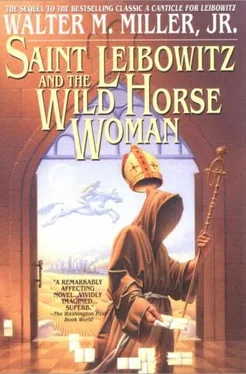Pop pop pop. The warriors pointed their rifles at the sky, barely visible as a smattering of stars behind the trees. The Grasshopper sharf had managed to keep only two shells apiece for them, but he knew that Brownpony had more, left with him as a concession from the stores in Magister Dion’s wagon train.
“You must give the men the rest of the brass bullets—Your Holiness,” Demon Light added, with a faint smile.
Amen II shook his head. “They must wait until my emissary comes back. Then your warriors can ride in, in triumph.” In fact, Brownpony was already worried. He knew that if Blacktooth had not returned by morning it would mean he had probably been killed; perhaps even hanged under the interdict they had both signed when they had been released from the zoo in Hannegan City.
“Tomorrow, then,” said Eltür Bråm. He looked up at the tree-hedged, moonless sky.
The Pope took the sharps arm. “And you must control them!” he said. Across the clearing, in the firelight’s gleam, he could see the sharf s carriage, with I set fires painted on the door. “There will be no fires, Demon Light. The farmers will surrender when they see your force. They may have already surrendered to Nimmy.”
“I think not—Your Holiness.”
“I want no fires in New Rome. I am here to restore the city, not to destroy it.” The Pope twisted the sharf’s arm. It was like arm-wrestling; the point was not to defeat him but simply to show that he knew and understood Nomad ways. “No fires, understood?”
“Understood,” said Eltür Bråm, pulling his arm loose and stalking off to join his warriors at the fire.
“I have unleashed a storm that I cannot control,” said the Pope, retiring into the wagon and arranging his robes for sleep.
He was speaking to Wooshin, who stood in the shadows beside the wagon. The Yellow Warrior shrugged. That was, as far as he was concerned, the nature of all storms and all wars.
The Pope was asleep when the farmers came. They had dismounted and were leading their horses across the creek when the dogs awoke, and awoke the warriors who were sleeping it off around the dying campfires. The fighting was brief and vicious, and except for the screams and the splashing, almost silent. The Grasshoppers were reluctant to use their few bullets but eager to try the knives and clubs that slept by their sides, where women might have been.
When dawn came, the water was still bloody in the little pools along the shore. Death by the knife is a messy, lingering business; some of the farmers still flopped like fish. Four of them were captive, uninjured except for the rawhide cord passed through their cheeks. They sat tethered in the shade of the food wagon, one whimpering, the others waiting stolidly for whatever awaited them.
The Pontiff awakened to find his camp almost deserted. The Grasshopper warriors were gone; so were their horses and the dogs. “You said you were going to wait!” he complained, finding Eltür Bråm by his fire, eating breakfast.
“They gave us no choice.” The war sharf shrugged. “They tried to steal our horses.”
Brownpony kicked the fire. “They were only a few fools. You could have chased them off.”
Eltür Bråm shrugged again. “The dogs followed them. My men had to follow the dogs. They are under orders not to burn the city, though.”
Brownpony didn’t believe him. And before noon the smoke was rising over the wall of trees to the east, from the city he had never seen.
• • •
The pig came in the morning, but the jailer didn’t She stuck her snout between the cool bars and sat, staring down at Blacktooth, who was trying unsuccessfully to pray.
As the morning dragged on, Blacktooth heard shots in the distance, shouts closer, the scuffling of feet in the narrow street outside. He still had six of the little pills but nothing to take them with. He was afraid of the warm water in the bucket by the door, so he took one with the last of his own spit. Toward noon, he drank the water.
Already hungry when he was locked in the cell, he grew hungrier. It was hard to tell time because there was no sun and it was raining, a gentle shower that spattered onto the alleyway all day, muddling the footsteps of the occasional passerby, always a dog, never a human.
The pig came again in the afternoon, or what seemed to be the afternoon.
Blacktooth kept the pills in his cardinal hat, which his captors had allowed him to keep, along with his cross and rosary. The zucchetto kept the little brown pills dry. They seemed to work. The fever was gone, and Blacktooth didn’t miss the cramps and the runs that had kept him busy, especially in the mornings, for days. But he felt lonely without the visions of Ædrea and Amen, the companions who had walked by his side and accompanied him not only through his dreams but through the interminable waking dream that seemed, lately, to be his life.
Blacktooth had never felt so alone. He remembered with a certain affection Brownpony and the prison-zoo in Hannegan City, when they had been spied on by the Wilddog prisoner and observed by the amused citizens. He remembered brooding, taciturn Wooshin. He remembered the insolent, chubby Aberlott, failed contemplative and lover of cities. He missed them all; he missed even Singing Cow. From his solitary basement cell, Blacktooth looked back on the life at the Abbey of Saint Leibowitz and wondered at the cunning and perfect mix of solitude and companionship that was the monastic life. Some men were made for solitude, but not most; and certainly not he. Specklebird had loved his solitude because he filled it with spirit. He was never alone. Ædrea’s solitude had been spook-solitude: accepted by none, scorned by all.
Desired by one.
The two of them in their solitude had kept Blacktooth company. But then, he thought, I don’t require much in the way of company. “Right?” he asked the pig when she stuck her head between the bars again. And like Ædrea, like Amen, she returned no answer.
By afternoon no food had come and the rain had stopped. Was there to be no last meal? To die seemed bad enough, and to die hungry seemed the final, the ultimate insult. Would he then be hungry forever?
Shocked at his own impiety, Blacktooth fell to his knees and prayed for forgiveness.
The door was heavy wood, probably oak. It seemed more substantial than the black iron bars on the little high window. Blacktooth knocked on the door, then kicked it, timidly at first, then harder and harder. There was no response. He couldn’t tell if anyone was out there or not. And what was out there—a hallway? He couldn’t remember. It had been dark when he was brought in. That had been only a day ago—hadn’t it? Blacktooth wished now that he had made marks on the whitewashed stone walls, as the previous occupants had done.
There was nothing in his little cell but the bed, which was two boards laid over stone blocks, a coarse wool blanket, a stool, and two buckets: one by the door and one in a corner. The bucket of warm water by the door was still almost full; the bucket in the corner was still empty. The room had apparently been used as a prison by the Texarki before; the walls were filled with intricate but illiterate scratchings—faces, smiles and frowns, a sun, various interpretations of the male and female body. The wall looked to Blacktooth like the surface of a monk’s brain, the scratchings on the soul that a man learns to live with and, usually, hopefully, eventually, to ignore.
He sat on the bed. He lay on the bed. He stood at the window. He stood on the stool and looked out the window. He saw a narrow deserted alley with a ruined step against a wall where there was no door. There were bloodstains on the wall above the step. While Blacktooth watched a dog came and sniffed at the stain, then walked away. Was this the end of it, then? The killing place? The stairs that went nowhere, the wall without a door… He shivered. He was very hungry.
Читать дальше








